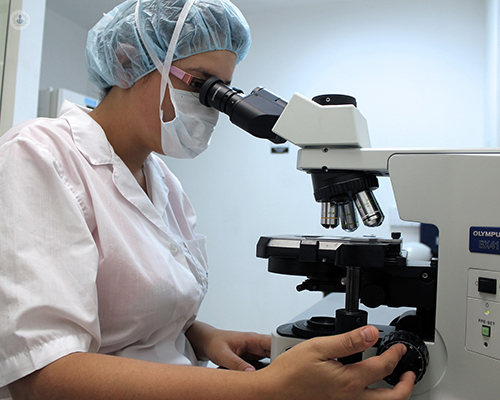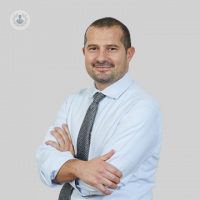How is male infertility diagnosed and treated?
Written by:Male infertility is a condition that many men feel a bit embarrassed about. For his latest article, senior consultant in obstetrics, gynaecology and reproductive medicine Dr Simone Rofena explains how male infertility is diagnosed, how it is treated, and the support available to you if you are diagnosed with the conditon.

How is male infertility diagnosed?
There are several different steps that can be taken to diagnose male infertility:
A general physical examination is typically the first test that will be offered to you by your doctor, as well as having a look at your medical history. The doctor will examine your genitals and inquire about any inherited conditions you may have, illnesses, surgeries or injuries that could affect your fertility.
A semen analysis is then generally requested. This usually involves masturbating into a container preferably in close proximity of the lab where the sample will be examined, to avoid unnecessary delays which might negatively affect the results. However, sometimes patients are unable to do this due to religious or cultural beliefs. If this is the case, a special condom can be worn during sexual intercourse to collect the sperm.
Once the semen sample has been analysed, your consultant will tell you if there are any problems, such as abnormalities in the shape, count or motility of the sperm or any signs of infection. To ensure that your test results are accurate, more than one test might be done over some months as sperm levels can naturally fluctuate over time.
Scrotal or transrectal ultrasounds are sometimes additionally recommended. These tests can help a doctor identify any problems with the testes, prostate or tubes that carry semen.
Hormone tests may also be recommended. Blood tests can be used to measure testosterone and FSH levels or other hormones that may be affecting your fertility.
Genetic tests can also determine if a low sperm count could be an inherited condition. This can happen due to abnormalities in the Y-chromosome or cystic fibrosis.

Can male infertility be treated?
Yes. There are several possible treatments available for male infertility.
Surgery: it can cure male infertility caused by several different conditions. For example, it can unblock obstructed vas deferens or correct a varicocele. Vasectomies done in the past can also be successfully reversed. Surgeons can also retrieve sperm directly from the testicles if sperm production is preserved but the sperm is not present in the semen.
Hormone treatments: Hormone replacement therapy may be recommended to the patient if previous hormone testing has shown that there are abnormalities in testosterone levels or with the way the body uses or produces hormones.
Treating infections: if there are any infections in the genitals or reproductive tract, then the doctor will recommend a course of antibiotics or another form of treatment to take care of the specific condition which has been detected. However, this does not always restore fertility to the patient as in some cases the damage caused by a previous infection or inflammation can be permanent.
Sexual dysfunction treatments: If the patient is suffering from any form of sexual dysfunction such as erectile dysfunction, a sexual health specialist can offer a range of different treatments that often have a high success rate.
Assisted reproductive technology (ART): ART treatments consist of retrieving sperm through ejaculation or directly from the testicles, which is then directly inserted into the female genital tract or used to fertilise an egg in the context of IVF.
In some cases male infertility is unfortunately untreatable. When this happens considering a sperm donor or adoption might represent alternative options.

What support is available if I am diagnosed as infertile?
When a patient is diagnosed as infertile, they are usually offered psychological counselling, as it can be tough news for many men to hear. However, not all men find counselling necessary.
The different treatment options will also be discussed between the patient and their doctor.
Dr Simone Rofena is a leading London-based gynaecologist, obstetrician and reproductive medicine specialist with over 15 years of experience. If you have concerns about male infertility, or any other reproductive or gynaecological condition, please don’t hesitate to book a consultation with Dr Rofena via his Top Doctors profile.


